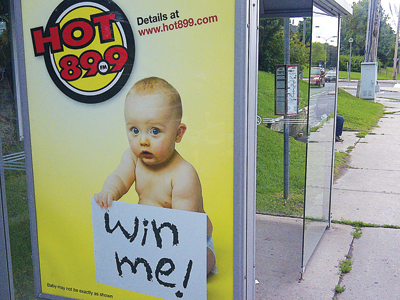 The Federal Communications Commission is proposing updated guidelines for broadcaster contests, allowing radio and television stations to post the rules for these events on websites as a substitute for completely explaining them over the air waves. At present “licensees are permitted to employ nonbroadcast methods for disclosing material contest terms,” but “they may not substitute such methods for the required broadcast disclosure.” Now the FCC suggests “modernizing” the rules to “allow broadcasters to satisfy their obligation to disclose material contest terms by making such terms available in writing on a publicly accessible Internet website.”
The Federal Communications Commission is proposing updated guidelines for broadcaster contests, allowing radio and television stations to post the rules for these events on websites as a substitute for completely explaining them over the air waves. At present “licensees are permitted to employ nonbroadcast methods for disclosing material contest terms,” but “they may not substitute such methods for the required broadcast disclosure.” Now the FCC suggests “modernizing” the rules to “allow broadcasters to satisfy their obligation to disclose material contest terms by making such terms available in writing on a publicly accessible Internet website.”
Not surprisingly, the industry is unanimous in its support of the idea. You can read all the hosannas yourself coming from the usual suspects in the proceeding: iHeart, Entercom, NPR, etc. Broadcasters have even put together a Coalition for the Modernization of the FCC Contest Rule—a gaggle of smaller broadcast networks.
“The Contest Rule was created in, and for, a media environment that no longer exists,” the Coalition opines. “The FCC adopted the Contest Rule in 1976, well before the Internet became a widely available resource for information. Today, consumers frequently turn to the Internet to access news, entertainment, and sports information – often from the websites of their favorite television and radio stations.”
You get the drift. I could have written most of these filings myself. But I wonder if broadcasters will think this is such a peachy innovation once it goes into effect. Here are three potential areas of difficulty.
Game rule checking while driving? As we noted in a post last week, despite the Internet and satellite and mobile wireless, AM/FM radio still dominates the average automobile. 81 percent of commuters still opt for good old analog radio on the way to work. So what are they going to do when the contest is announced and the Morning Zoo gal or guy says hurry up and call in or text or tweet or whatever: check the game instructions website on their mobile while driving? I suppose some will and, assuming that they don’t kill themselves or somebody else in the process, they’ll know the score. But a lot of people won’t even bother, and the station in question will have to deal with folks calling or texting without understanding what they’re actually supposed to do or stand to win. Crabbiness will ensue. It won’t be pretty.
Rules will overproliferate. One of the virtues of requiring radio stations to outline their contest rules over the airwaves is that it functions as a form of discipline. The conditions must be explained simply and concisely. But once game instructions migrate to web pages, that virtuous limitation will disappear. The temptation to add this or that codicil or condition will be irresistible (especially when lawyers are consulted). Game rules that were once simple will become more and more complicated. And this will lead to Problem Number Three.
Which rules are the rules? Most radio station game contests go well, although some go south on a pretty spectacular level. But even if a contestant doesn’t die of water asphyxiation, there are already instances of radio stations botching contests that included web based information. These included contests in which winners were announced before the stated online game entry period concluded; or, even creepier, a station that told listeners they could win “10,000” in a game. The website, however, stipulated that this meant 10,000 Italian lira, the equivalent of a little over 50 USD.
The FCC understands that this could be a problem. “To avoid consumer confusion, we propose that, consistent with existing Commission precedent, any material terms announced on air must not differ from the material terms disclosed on a Web site,” the agency’s Federal Register proceeding announcement explains. “For example, if the on air announcement or advertising for the contest identifies a particular prize by brand name or model, then the Web site disclosure must be the same.”
But of course once a radio station can disclose contest rules in more than one place, the potential for accidentally announcing and publishing different versions of the game doubles. The Commission gets this as well, acknowledging that stations might have to change their game rules in the middle of the contest. “If a licensee that chooses to satisfy its disclosure obligations via the Internet changes the material terms of a contest after the contest is first announced,” the FCC observes, “we propose that the licensee must announce on air that the contest rules have changed and direct participants to the website to review the changes.” But will the announcer also remind listeners to reload the cache on their websites?
Sorry to be such a Debbie Downer on this proposal. I’m sure that most of the time the contests will go reasonably well. But I think there’s a subtext motivation for this drive to “modernize” radio station contest rules: the consistent, three decade old desire of radio license owners to relieve actual human beings of the obligation to clearly say and explain things over their stations on a real time basis. In any event, we’ll see how it goes. After all, nothing can stop a bad idea whose time has come.


